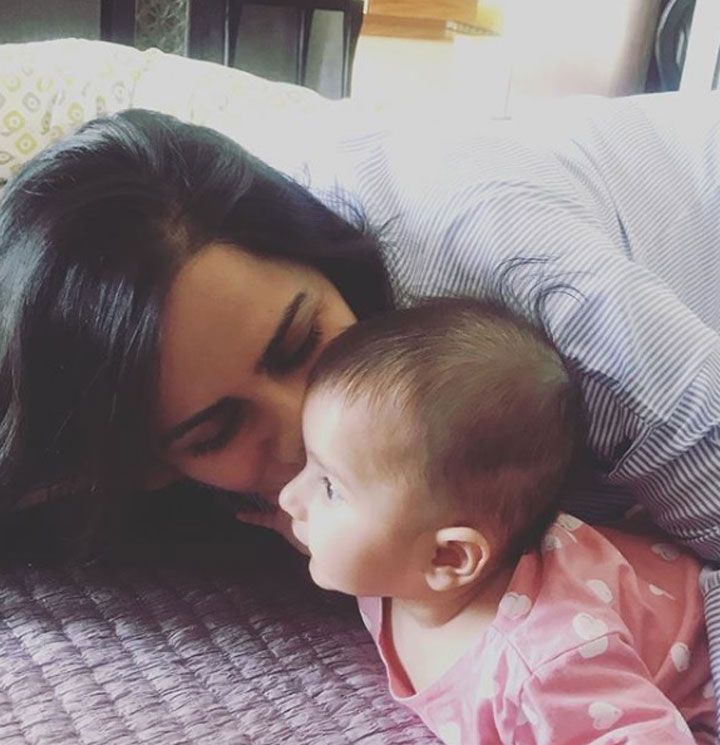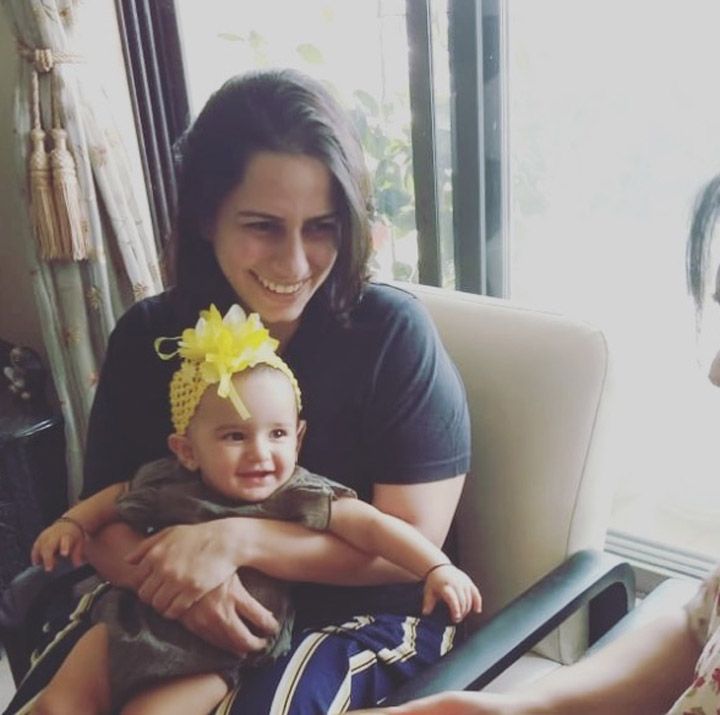Okay, let’s start with the fact that I’m not a mother. But when I saw this post of Hilary Duff on her Instagram, it gave me a completely new perspective on the struggles of new mothers. Like, when to stop breastfeeding and switch to formula or solid food, is such a huge decision to make, but no one really talks about it, right? Weirdly, this also reminds me of an episode of The Marvelous Mrs. Maisel where Midge had to step down from the stage just because she made a few pregnancy jokes. But that was the 1950s, and we’re almost in 2020, so you’d expect things to change by now, right? Well, certain topics related to the miracle of birth are still not talked about openly or often enough.

We’re tackling one such subject today and that’s breastfeeding. So, here’s what all I learnt about breastfeeding from the first-hand experiences of two mothers, Sasha Chhetri and Neha Jambotkar.
A Good Latch
https://www.instagram.com/p/BxXacA8ppCv/
Sasha: When you are pregnant, and right up to when you are about to deliver, people around you shall give you 10,000 tips, share all kinds of things about their experiences—how it was for them to deliver, what helped them through pregnancy, etc.—but for some reason no one seems to ever talk about breastfeeding. I don’t even necessarily think it’s because it’s a taboo subject; I think it’s just a habit. Nobody thinks to talk about it, you know? A lot of women don’t even know that the majority of women are having the same experiences as them. They think they’re failing by not being able to breastfeed, but the fact of the matter is that it’s hard for everybody. Without the correct education, most women tend to give up on breastfeeding.
When I was pregnant, I had a lot of time because I decided not to work. So I did this thing called a ‘slow pregnancy’. I took a lot of classes, did a lot of research and actively reached out to lactation consultants and attended their talks and programs. So I already knew the basics of breastfeeding, but I still didn’t realise how difficult it was going to be. In one sense, because of the research, I had already started from a place of knowledge, but it was still so difficult for me! And I am in the minority. The majority of women (my friends included) don’t have any knowledge about it. I just had the time, you know? When I started breastfeeding, it hurt a lot. Both mom and the baby need to be taught what a ‘good latch’ is. So if the baby doesn’t latch properly, it tends to hurt. You can get blisters and at times even bleed.

Neha: In this feeding journey, it takes a really long time for a new mother to set a routine. Many children have issues latching. So, there’s a lot of stuff out there that can prevent them from having a smooth breastfeeding journey. But once you’re there, you don’t want to give it up so easily because it’s your best time with your child.
Nowadays, in most hospitals, you’re offered a lactation consultant as part of a package. This is great as they teach you different ways of feeding. I had a C-section, so I started feeding my daughter in a ‘football position’ the consultant taught me. Every new mother should take the help of a lactation consultant to understand the process.
The most important thing is that as a mother, whatever decision you make for yourself and the child is fine. Breastfeeding is not the end. If it’s not working for you, it’s okay to resort to a combination of feeding breast milk as well as formula. Don’t judge anyone. Combination feeding involves one or two times of giving your child formula. Yes, your supply may go down, but it’s not the end of the world. Every time I gave my daughter formula (usually once in the night), I would pump and she’d have that pumped milk in the morning. So what started happening was that I got a break for two feeds and I started catching up on sleep. You have to find things that work for you, that’s all I’m saying. Feeding your child is the best but you can’t be obsessive about breastfeeding. I feel like every mother should make her own decision.
Breastfeeding is also the best because it’s unique and economical, and it’s supposed to be the best for the child. But having said that, it’s okay if you want to give formula also. Point is, in the first three months, every child is cranky as their digestive systems are being formed, so they have issues. So, mothers who want to do formula, it’s not a big deal, I did both. From day one I adopted one feed of formula. I think one should stress that a happy mother is the best mother!

The Demand & Supply Theory
Sasha: Sometimes what happens is, if your baby is not feeding properly, it’s because your nipples are clogged up, and every time your breasts get heavy with milk, they tend to hurt and the pain is genuine! It’s like if someone punched you on your breasts. Anyway, you’ve just delivered, your body’s weak, then you’re trying to teach your baby to latch and it hurts like crazy. If you don’t have the right knowledge, you tend to give up. And then the most common belief is, “I have a low supply.” That’s what a lot of moms say, and what a lot of moms are told, and what a lot of us believe too! But any lactation consultant will tell you that unless your doctor has flagged you medically, or has found some nutrient deficiency in you, or in the way your body’s absorbing nutrients, there is no way a mother’s body would not be able to produce milk for the child. What happens with the majority of moms is that they don’t consult any medical professional before they decide that their supply is low. Basically, it’s hurting a lot, your baby’s crying all the time, and you can feel like the baby is hungry and you’re not providing enough for them, and you are exhausted. So you tend to feel guilty and give up.
Also, you have to understand that babies are constantly changing. Imagine, you’ve hit your six-week mark and you’re committed, but nobody told you about a thing called a ‘growth spurt’. These are critical times. When this growth spurt happens, the baby will start feeding a lot more than they are used to and that means that the rhythm that you’ve built up to till that point is gone. Suddenly it feels like your baby is hungry all the time! And then, if you don’t know what a growth spurt is, you are back to questioning your supply, and then a few well-intentioned women around you will say, “Feed formula, it’s perfectly fine.” Then you go and do that, and what happens as a result is your supply goes down because instead of feeding your baby more breast milk, you’re supplementing with formula. Ultimately, supply is just about demand. The more you feed your baby, the more you will supply. The more your baby feeds, the more you pump, the more you will supply. So, if you do know about the growth spurt, then just push through, and in a week or maximum 10 ten days, you’ll see your supply equalise again. Knowledge arms you with a little bit of confidence when you face these problems.
Neha: The process is about supply and demand. And you can’t quantify it by saying, ‘let’s press the breast and see how much comes out’. The child suckles in a way that opens the milk ducts. Nobody else can do it in that way. The best pump in the world can only remove up to 70%, which means, at times it’s not an indicator of your supply but it does play games with your head. I was constantly like, “Oh my god, have I not got enough milk for her?” or “Oh my god, am I not producing enough milk for her?” Once I had the knowledge, I said, “Listen, this, what I’m removing in the machine, is not indicative of how much I have for my child.” But everyone does not have access to this information.
Just make informed choices. Don’t feel like because your supply is not good, you’re giving formula. It’s a trigger for depression. It’s can be a break for an hour and a half, which may be desperately needed. Let her have it. You’re happy at your end, you’re not fretting. So, it makes a difference.
Now I feel like first people obsessed about giving milk, and now everyone’s like how long will you feed for? After nine months, I started getting judgmental comments, but in the end, it’s my wish to continue or not. My paediatrician wants me to feed her for a year, at least. But when she’s cranky or upset, or she’s travelling somewhere, there’s nothing that makes her more comfortable than my own milk. It’s like an answer to all the crankiness issues. It’s comforting for her so why would I let go of that, till she becomes good at communicating and telling me otherwise? I don’t want to feel harassed for nursing my baby even if she’s a little older. I think it’s fine, we should remove this stigma.

The Importance Of Education And A Good Support System
Sasha: The next thing is the support system. I think knowledge doesn’t only stop at the woman. I think the woman’s partner as well as her in-laws or mother, whoever is going to be the support system around after she’s delivered, also needs to be educated about breastfeeding, because the woman needs a lot of positive support if she is going to push through breastfeeding her child in the first 40 days, or the first six weeks. It is usually in this period that the woman gives up. Her partner has to step in and help out with things other than breastfeeding that he can help with. People tend to see a woman breastfeeding as completely natural. She should be able to do it easily. But that’s not the case. One way of showing support is to simply acknowledge that breastfeeding is a big job that the woman is already doing.
But, of course, one has to remember that there are women who cannot breastfeed with genuine, medical reasons too. One has to be sensitive towards their feelings as well. Try to be conscious about how you say certain things because it can be hurtful. So instead of saying, ‘Breast is best,’ maybe say, ‘Fed is best’. Empathy goes a long way because women tend to feel very deeply and strongly about this and it might affect them adversely to think that they weren’t capable of providing for their baby because they were unable to breastfeed. It can be very difficult for these women, so you need to be aware of that too.
Neha: You really need support; my family has always been supportive. They told me, “Listen, no one will judge you if you feed her formula.” But it was me who persisted, and today I am proud that I did. But I had this thing that I have to give her the best I can. I had read something Sasha posted once, ‘I might lose sleep for 2-3 years of my life, but what’s that in the big picture.’ I love sleeping but sometimes I have very bad nights. So that’s why I think I can’t come back to work. It’s a trade-off. I don’t want to get irritated with her in the night because I have to go to the office in the morning. I feel like it’s a gift and a curse, both, that I have to feed her. But now after nine months of feeding her, even today it she gets so happy when she sees me. I don’t think anyone, including her father, has cheered me so much after seeing my boob, as much as she does.
Honestly, I had a little bit of a tough pregnancy emotionally and physically. But I never factored in the post, and that I think is the toughest part once you have the baby to feed—to have a baby biologically depend on you. Everyone tells you that that’s their nourishment, and because a child cannot communicate, anybody and everybody is concerned about whether they are getting enough. That kind of pressure, when you have just been through a delivery or a surgery–I had a surgery so my body was also recovering—it’s really difficult to deal with. But then I joined this Facebook group that really changed me. Their group is a support group for breastfeeding mothers in India. It’s called Breastfeeding Support for Indian Mothers (BSIM). This really changed my breastfeeding journey, I learned that it’s not possible that a mother’s milk is not enough, and if a child is suckling that means they are taking milk. And there are certain indicators which nobody tells you unless you ask for. Like there should be six feeds in 24 hours. That ensures your child is getting enough. Honestly, every child’s metabolic rate is different, it’s not necessary if you have a chubby child that they are healthy. In the beginning, you’re just constantly feeding.

Breastfeeding Is As Important As Pregnancy & Delivery
Sasha: It’s very important to change the way we look at breastfeeding completely. Look at it as something where moms need help and support and we have to stop thinking of it as ‘nature and natural.’ And finally, you have to stop thinking of breasts as sexual organs; they’re not. They have nothing to do with reproduction, and everything to do with sustenance and nourishment.
The topic of breastfeeding has to be approached sensitively and with a medical bent of mind. We do need the help of lactation consultants, and gynaecologists should start referring women to them. It should be during pregnancy itself because once you deliver, you’re really overwhelmed. It shouldn’t be assumed to be a mother’s natural duty or you know, one that women are supposed to do. So the basic concept needs to change a little.
Neha: There needs to be a prenatal, basically, before you go to the hospital, gynaecs or hospitals should have a session with a lactation consultant to tell mothers. Especially, when you have a C-section, as it’s a major surgery. So you’re in a very bad state, you have a baby, and the baby is dependent on you for food, so hospitals obviously have the formula ready. You should be aware that your child is having formula at the hospital. So, be equipped with the right knowledge, and make a feeding plan for your child. It should be an informed choice, so you’re happy.

Breastfeeding In Public
Sasha: Another issue is breastfeeding in public. Airports or malls have feeding rooms right next to the toilet, so it’s safe to say that it’s not the most hygienic. Spaces should be taken better care of, especially because babies are so sensitive to everything. I have also noticed that they use harsh lighting in a lot of breastfeeding rooms in India. I think they don’t realise that when you’re breastfeeding a baby, the baby is looking up and the harsh light may hurt their eyes. This goes back to the concept of support. Our thinking has to change so that society supports breastfeeding mothers. Breastfeeding means that your baby are eating food. You would not eat food near the toilet. You would not eat food in a stinky, dirty room. So why would you assume that it’s okay for babies to do that? When people talk about breastfeeding, they think of the breast. You will never think of the fact that it’s a child eating. They need to have proper facilities and not just make a room so it ticks a box.
Neha: In the west, women are not ashamed to breastfeed publicly. For me, it’s just that my child needs my milk, my child needs food, but the problem is, I can’t do it anywhere I want. I have heard horror stories of facilities in malls but haven’t really been there. However, I have been to the Mumbai and Goa airport’s facilities. Mumbai airport was frankly not that bad. It was tiny, so if there are more than three mothers, you wouldn’t have space to feed and you’d have to wait. And nobody wants to wait when their child is hungry and crying. Goa airport was horrible, their AC wasn’t working. Again it’s not ‘normal’ at restaurants to feed, with all the looks you get, and my child hates the nursing cover. It’s annoying for her. She feels hot and sweaty. In the end, I was like, ‘Why am I even doing this?’
Breastfeeding Provides Immunity
Sasha: The reason breast milk is preferred over formula is that your breast milk is customised to your baby. For example, if my daughter has a cold, my breastmilk automatically provides antibodies to fight that cold because the virus comes in touch with my body. So, while the formula does provide them with the vitamins, it doesn’t necessarily provide the immunity.
Neha: Even today, after everything I’ve read and understood, people are like “Oh, she’s nine months old, you should stop feeding her, don’t go on for so long”, but that’s not right. In fact, most people say feed as much as you can, it builds immunity and gives many other benefits. After giving birth, I have fallen sick so many times, I have been on antibiotics for like 10 days, 2-3 times. That’s like a month worth of antibiotics, but I never stopped feeding her. My doctor asked me to continue her feeding, and she built resistance because my body produced antibodies to protect her. So every time I am sick, I try to feed her as much as I can so that I can protect her. People don’t share this information.

After getting the lowdown from these star mothers, we also asked a lactation expert some FAQs that cover all the essential info you need about breastfeeding, which we will be bringing to you shortly, but till then, join the conversation on Malini’s Girl Tribe on Facebook.

